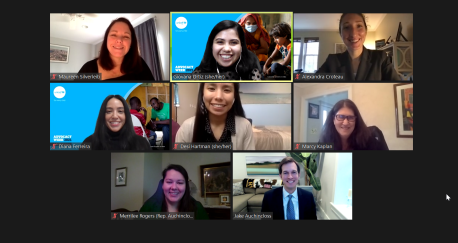
Worth the Wait: The READ Act is Signed into Law
This legislation would make quality basic education in developing countries an objective of U.S. foreign policy.
At 5:00 pm on a Tuesday afternoon, Representative Nita Lowey of New York, took to the stage to polite clapping. Despite the late hour, Global Citizen’s Movement Makers Summit was just revving up for its grand finale: An Evening for Girls’ Education. Audience members—like me—were eager to hear what Congress was doing to advance the cause. During a year of proposed cuts to foreign assistance, it was encouraging to see a true children’s champion like Congresswoman Lowey in front of us.
With tremendous joy and pride, Rep. Lowey announced that the Reinforcing Education Accountability in Development (READ) Act of 2017 had been signed into law. What had been polite clapping morphed into great applause, as Rep. Lowey spoke of how the legislation would make quality basic education in developing countries an objective of U.S. foreign policy. Looking out at us, she remarked that passing the legislation was a team effort- “Global citizens are needed!”
The READ Act started as an idea: what if the United States could be a leading force to ensure that every child has an equal opportunity to a safe, quality education? In 2004, the Education for All Act was first introduced. It would take 13 years, but the core of Education for All—renamed the READ Act—would finally become law this September 8.
Advocacy requires persistence. Sessions of Congress only last two years, providing lawmakers a limited timeframe with which to introduce legislation, secure its passage and see it signed into law. Since 2004, every two years Congress would adjourn without passing this bill; every two years, the Education for All Act was re-introduced into both the House and the Senate. Grassroots supporters and coalition partners like Global Citizen never stopped speaking out for this crucial legislation, which would work to reach the 123 million children under 15 worldwide who are out of school, and improve the quality of education for those already enrolled.
Effective advocacy is also rooted in bipartisanship and trust. In its final iteration, the READ Act was championed by original cosponsors Rep. Nita Lowey (D-NY), Rep. David Reichert (R-WA), Sen. Marco Rubio (R-FL), and Sen. Dick Durbin (D-IL). Throughout the journey of the bill, UNICEF USA advocates continued to build and strengthen relationships with their Members of Congress, shedding light on the importance of quality education for all children—regardless of gender, ethnicity or circumstances.
With the enactment of the READ Act of 2017, the United States Agency for International Development (USAID) will be tasked with developing a strategy to work with partner countries and organizations to promote basic education in developing countries, even designating a Senior Coordinator of U.S. International Basic Education Assistance within USAID.
It’s because of you—your tweets, your letters, and most importantly, your personal interactions with Members of Congress—that this legislation maintained its momentum resulting in long-term policy.
As Rep. Nita Lowey said, “Global citizens are needed.” Take a moment to celebrate today and keep on advocating tomorrow!
HOW TO HELP
There are many ways to make a difference
War, famine, poverty, natural disasters — threats to the world's children keep coming. But UNICEF won't stop working to keep children healthy and safe.
UNICEF works in over 190 countries and territories — more places than any other children's organization. UNICEF has the world's largest humanitarian warehouse and, when disaster strikes, can get supplies almost anywhere within 72 hours. Constantly innovating, always advocating for a better world for children, UNICEF works to ensure that every child can grow up healthy, educated, protected and respected.
Would you like to help give all children the opportunity to reach their full potential? There are many ways to get involved.





